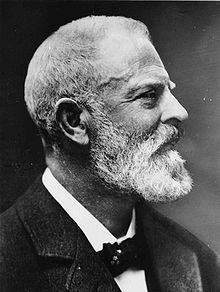See also: SS Adolph Woermann
You can help expand this article with text translated from the corresponding article in German. (January 2011) Click for important translation instructions.
|

Adolph Woermann (10 December 1847 in Hamburg – 4 May 1911 in the Grönwohld-Hof near Trittau) was a German merchant, shipowner and politician, who was also instrumental in the establishment of German colonies in Africa. In his time he was the largest German trader to West Africa and – with his Woermann-Linie – the largest private shipowner in the world. He remains a controversial figure, for the fact that he accumulated his vast fortunes from exploitation and war profiteering, particularly during the Herero Wars.
When the Herero uprising broke out in German South West Africa, Woermann's company was the only one which offered an open connection to the colony. Soldiers, horses, weapons, equipment, and supplies were transported to the colony almost exclusively through his company. By 1906, the Woermann Line had transported over 14,000 men and over 11,000 horses to the war zone. The company also used warehouses to store beds, provisions, and equipment for departing troops. The war brought Woerman unexpected profits, which nearly doubled during the Herero and Nama genocide. Woermann transported several hundred Hereros to Swakopmund for forced labour. During the war, the Woermann Line received 115 prisoners to be used for forced labour. Nearly a tenth of the company's workers did so without pay. The company ran its own labour camps.
References
- Klaus J. Bade: Friedrich Fabri und der Imperialismus in der Bismarckzeit. Revolution – Depression – Expansion. Archived 19 July 2011 at the Wayback Machine Freiburg i.Br. 1975, 2005 (2005 mit neuem Vorwort: Osnabrück), S. 362 (retrieved 23 November 2006)
- Klaus J. Bade: Friedrich Fabri und der Imperialismus in der Bismarckzeit. Revolution – Depression – Expansion. Archived 19 July 2011 at the Wayback Machine Freiburg i.Br. 1975, 2005 (2005 mit neuem Vorwort: Osnabrück), S. 315 (retrieved 23 November 2006)
- ^ Alexandra Gittermann (23 March 2021), "Afrika-Ausbeuter Adolph Woermann - Steinreich durch Schnaps und Zwangsarbeit", Spiegel Online (in German), retrieved 23 March 2021
- Kim Todzi: Unternehmen Weltaneignung. Der Woermann-Konzern und der deutsche Kolonialismus 1837–1916 Wallstein, Göttingen 2023, S. 376–379.
External links
Categories:- 1847 births
- 1911 deaths
- Businesspeople from Hamburg
- German Lutherans
- National Liberal Party (Germany) politicians
- Members of the 6th Reichstag of the German Empire
- Members of the 7th Reichstag of the German Empire
- 19th-century German businesspeople
- Businesspeople in shipping
- German colonisation in Africa
- 19th-century Lutherans
- Herero and Namaqua genocide perpetrators